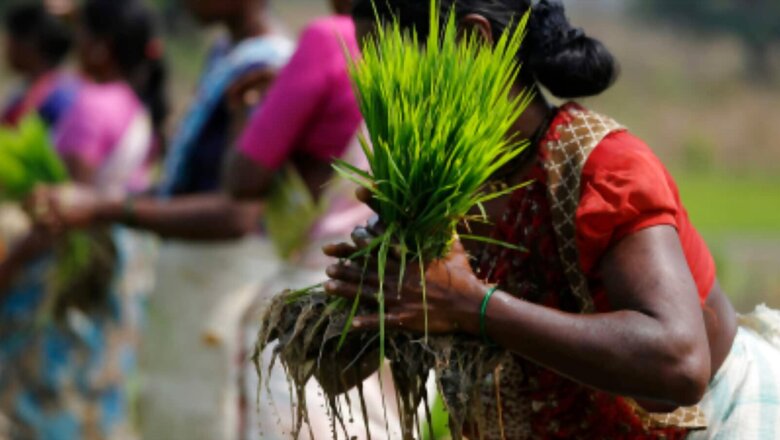
views
It is a confrontation that has no meritorious justification because there is none for putting the cart before the horse! For over a year, farmers have been protesting against the Centre’s three controversial farm legislations, which Prime Minister Narendra Modi announced will now be repealed. The announcement came on a day that marks Guru Nanak Dev Parkash Utsav.
In a democratic set-up, people’s voice—whether for or against the government—is very important. No one can deny the fact that efforts need to be made to ensure positive changes in the agriculture sector as well as in the lives of farmers.
The stalemate may end now. The last conversation between farmers and the government took place on January 22 this year. Since then, nothing has moved in the right direction except posturing from either side, which hardly serves any purpose. Farmers are the most important stakeholders in agriculture. Now, the time has come to repeal and replace these three farm laws with the Guaranteed MSP Act.
Where there is intent, there is a way! A law promising guaranteed minimum support price (MSP) is the next step after repealing the three laws. It will be future-oriented for the agriculture sector. Farmers’ problems are systemic. Hence, farmers also should focus on solutions to their problems. Revival of assured minimum income is a matter of life and death for small and marginal farmers, who account for nearly 86 per cent of the country’s total farmer population. These farmers have always been used as a tool by political parties, many of whom are throwing their weight behind the current farmers’ movement but have not been able to empower farmers even after 75 years of Independence!
Their blood and sweat took the country out of the jaws of the alarming hunger problem. As a nation, we have not yet forgotten the food crisis of the 1960s when millions died due to hunger-related complications. The toil of farmers and farm workers led to the Green Revolution in Punjab, Haryana and western Uttar Pradesh, leading to bumper crop of wheat and rice. Most farmers in the Green Revolution belt are today caught in a vicious circle of debt. They will celebrate the Azadi Ka Amrit Mahotsav in the real sense of the term when they are provided the cushion of guaranteed MSP as this will help them become debt-free over the next few years.
Will the chain of farmer suicides in Maharashtra, Telangana, Bihar, Punjab and Maharashtra break so long as farmers are burdened with debt? Has the financial condition of small farmers in India improved even after five decades of the Green Revolution? These are questions that are on top of the mind of a farmer, who is looking for some light at the end of the tunnel.
The biggest problem is the farmer not getting the price for their crop. Every year the central government announces MSP for 23 crops but the procurement at these prices is not guaranteed because the MSP is not legally binding on the agencies and buyers of these crops. In a season of bumper crop, the price received by the farmer does not even meet the cost of transportation of the produce from the farm to the market. According to an OECD-ICRIER report, farmers have suffered a loss of Rs 45 lakh crore between 2000-01 and 2016-17 as a result of non-payment of their input cost dues.
There are more than 100 crops in the country but MSP covers only 23. Further, barring two-three crops in three-four states, government procurement at MSP is not ensured in most states. Only six per cent of the farmers in the country get MSP on three-four crops, out of which 85 per cent are farmers from Punjab and Haryana from whom the government agencies buy wheat and paddy at MSP. That’s why maize sowing is almost over in Punjab except in some semi-hilly stretches of Pathankot and Hoshiarpur districts. During the current Kharif season, farmers were forced to sell their maize at Rs 800-Rs 1000 per quintal instead of the government-approved MSP of Rs 1,870 per quintal.
To uplift agriculture, Prime Minister Narendra Modi had said in 2017 that such steps are being taken by the Centre which would double the income of farmers by 2022. Farmers too need to know from the government what steps have been taken so far to double their income, when they go for the next round of talks. And, farmers should also suggest measures that can be taken to ensure farming does not become a loss-making occupation.
Time is right for the farmers and the government to sit together and identify core measures that must be taken to increase farm income. Prime Minister Narendra Modi has indicated that in the upcoming Winter Session of Parliament the central government will repeal the three farm laws and a committee will be set up to consider guaranteed MSP for all agricultural produce, to end the farmers’ agitation. After all, assured MSP is the lifeline of agriculture.
The writer is Vice Chairperson of Punjab State Planning Board and Chairman of ASSOCHAM Northern Region Council. The views expressed in this article are those of the author and do not represent the stand of this publication.
Read all the Latest Opinions here




















Comments
0 comment